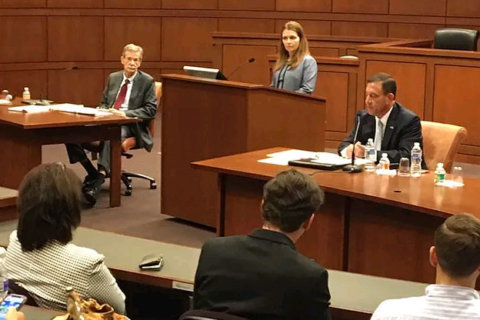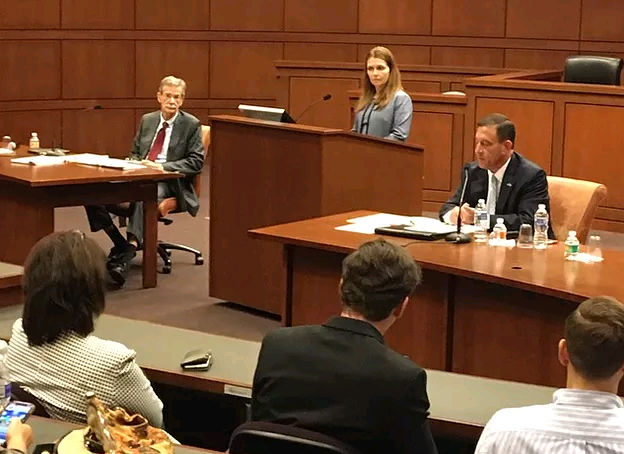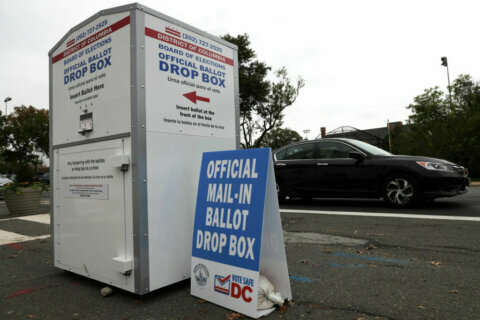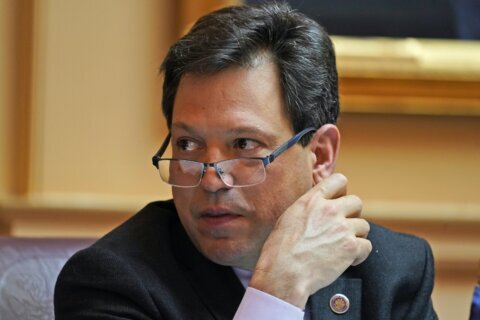This article was republished with permission from WTOP’s news partners at Maryland Matters. Sign up for Maryland Matters’ free email subscription today.

Attorney General Brian E. Frosh (D) and his Republican challenger, Craig Wolf, clashed over crime, the opioid epidemic, Maryland’s lawsuits against the Trump administration and a host of other issues during a wide-ranging and occasionally personal debate at the University of Maryland Carey School of Law Wednesday night.
Wolf, a former prosecutor who until recently led a wine and liquor wholesalers trade association in Washington, D.C., used the occasion to launch a series of attacks on Frosh, whom he accused of neglecting violent street crime in Baltimore City, engaging in a “back-room” deal to weaken the state’s bail laws and focusing too much time on lawsuits against President Trump.
“Baltimore is the murder capital of the country,” he said in his opening remarks. “Gang and gun violence are out of control. My opponent seems more focused on national issues.”
Frosh, a former state senator seeking a second term, defended his record.

Attorney General Brian Frosh (left) and challenger Craig Wolf at Wednesday night’s debate. University of Maryland Law School professor Deborah Eisenberg moderates. Photo by Bruce DePuyt
“We have indicted and put behind bars hundreds of the most dangerous people in our state — drug traffickers, human traffickers, pill mill operators, violent gang members,” he said. “Our office has had an outsized influence.”
Frosh’s numerous lawsuits against the Trump administration — “25 to 30,” by Wolf’s count — were a major source of contention between the two men.
“He’s using taxpayer money and resources to sue the federal government instead of using them the way they should be used, which is public safety,” the challenger charged.
Wolf seemed to suggest that the federal General Services Administration opted not to move the FBI headquarters to Maryland because of Frosh’s frequent tangles with the White House.
“I’m protecting Marylanders from the worst acts of the Trump administration,” Frosh countered.
“We’ve gone to court to save affordable health care. At the 11th hour we were able to stop the posting, on the internet, of the plans for 3-D printable guns. We’re battling to make sure that offshore drilling doesn’t endanger our treasured Chesapeake Bay.”
Wolf said that Frosh’s frequent lawsuits against the president are one reason the Fraternal Order of Police and many of the state’s sheriffs are endorsing him. “If you have been such a great prosecutor, why is it that you lost law enforcement?” he taunted.
As the 90-minute debate wore on, the two men resorted to more personal attacks.
Wolf, who joined the military in 2003, turned to Frosh and declared, “I served this country. You did not. You avoided service in Vietnam.”
Frosh, in his first counter-attack of the campaign, charged that the trade group Wolf leads fought proposals to lower the legal blood alcohol limit for motorists, and that it opposed “Noah’s Law” and similar measures that require repeat drunk drivers to install ignition interlock devices — a charge Wolf denied.
Frosh noted the differing views the two men have on guns.
“When I was leading the Maryland Firearms Safety Act, the law that bans the sale of assault weapons, through the state Senate, my opponent was rushing out to get one before the deadline and complaining that the background checks took too long,” he said.
Wolf accused Frosh of engaging in a “back-room deal” to change bail rules in a manner that has led to people accused of serious crime being released pending trial — a charge Frosh vigorously denied. The challenger labeled his opponent a “career politician… who supports far, far left-wing causes.”
The most recent poll in the race for attorney general, by Gonzales Research, showed Frosh with a 43 percent to 34 percent lead, with 23 percent of voters undecided. The survey was taken just before Frosh, who has a massive fundraising advantage, took to the airwaves with ads touting his reelection bid.
Approximately 80 law students and professors watched the debate in person, with another couple dozen watching a livestream on YouTube. The debate was moderated by law professor Deborah T. Eisenberg, director of the university’s Center for Dispute Resolution. She asked several questions, and others were posed by students.
Media coverage was meager. Given the microscopic audience, the encounter seems unlikely to influence the race very much, except to underscore the substantive and stylistic differences between the two men, something both acknowledged.
Wolf repeatedly claimed that Frosh “won’t go on TV to debate me,” a charge the incumbent did not refute.
The two are tentatively set to debate a second time, at the University of Baltimore Law School, though a date has not been set. Frosh said Nov. 2 is a possibility – a debate that would occur after early voting and just days before the election.







